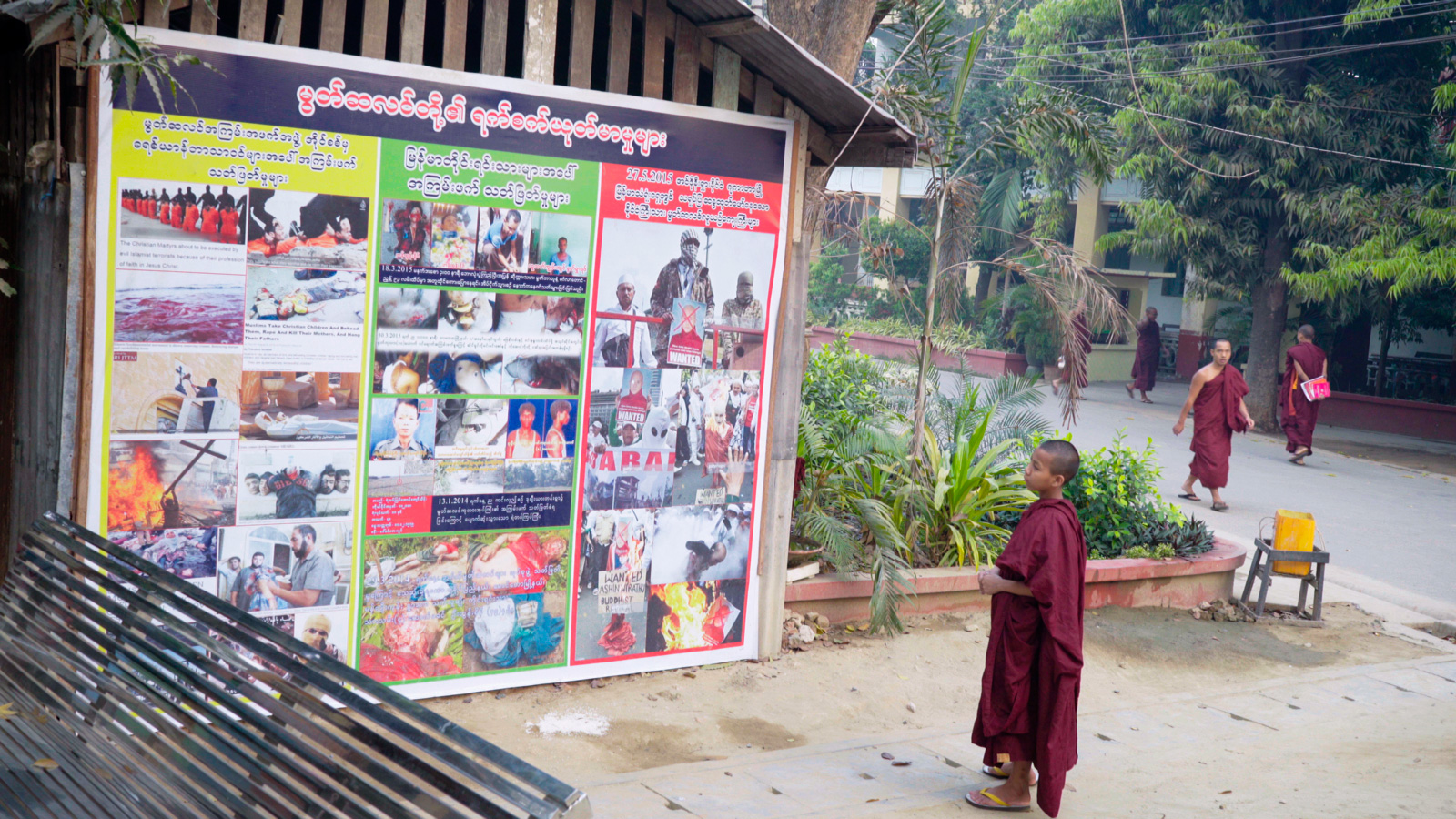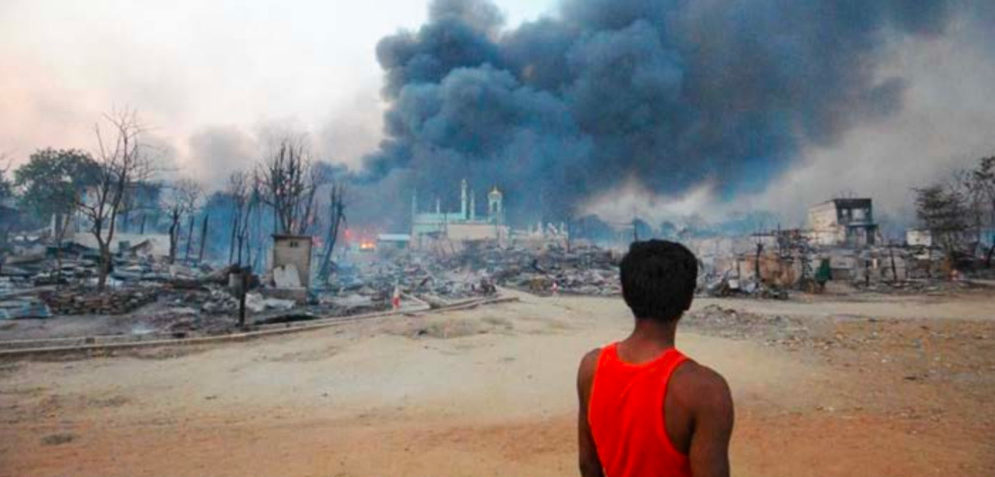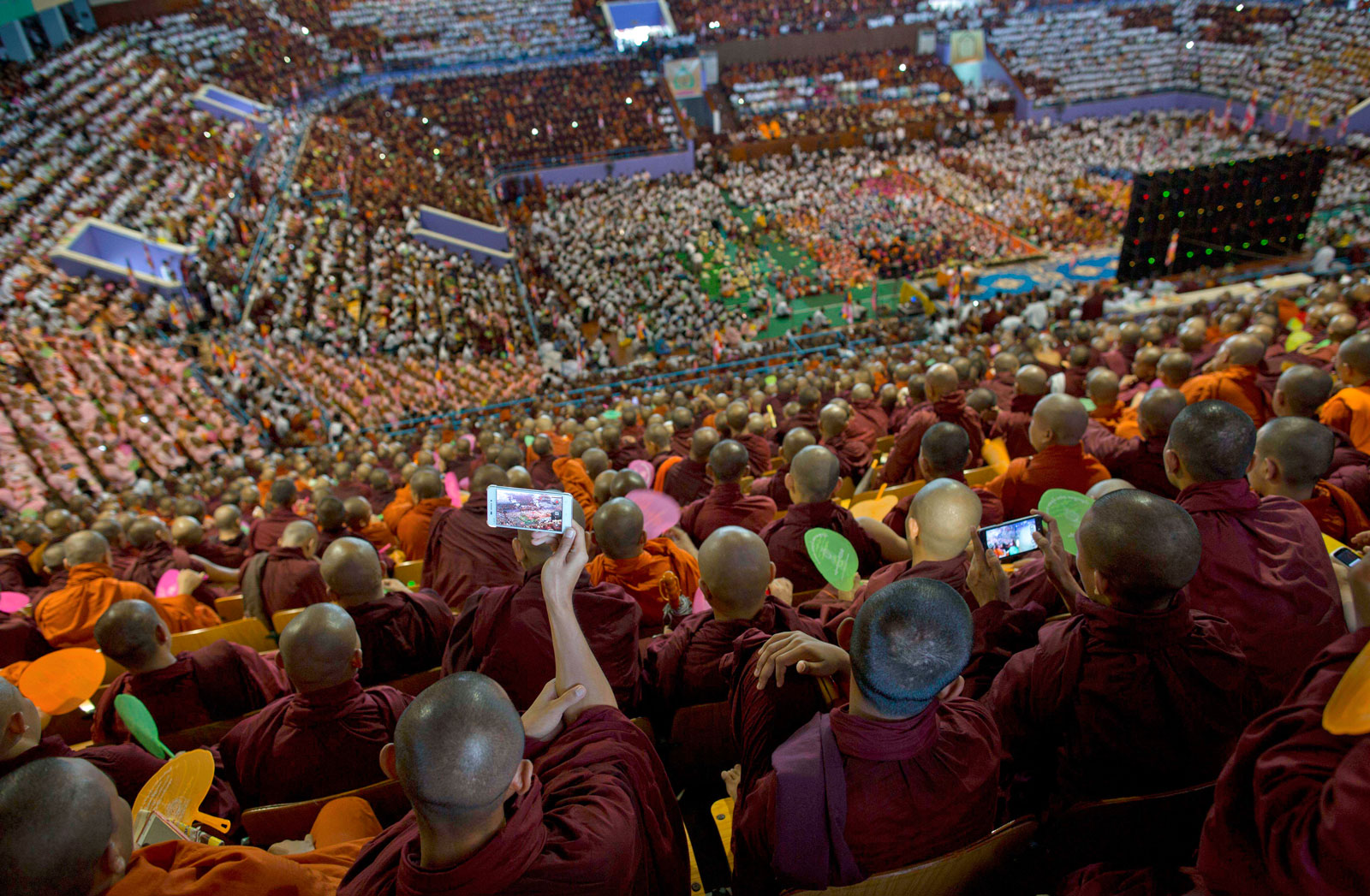Ma Soe Yein is the largest Buddhist monastery in Mandalay, Myanmar. A dreary sprawl of dormitories and classrooms, it is located in the western half of the city, and accommodates some 2,500 monks. The atmosphere inside is one of quiet industry. Young men, clad in orange and maroon robes, sit on the floors and study the Dharma or memorize ritual texts. There is little noise except for the endless scraping of straw brooms on wooden floors, or the dissonant hum of people in collective prayer. Outside, the scene is livelier. Monks hurriedly douse themselves with cold water, and chat politics over a table of newspapers. They do so in the shadow of a large wall covered with gruesome images depicting the alleged bloodlust of Islam. Photographs, displayed without any explanation or evidence of their origins, show beaten faces, hacked bodies, and severed limbs—brutalities apparently committed by Muslims against Myanmar Buddhists.
The contrast between the monastery’s inner calm and this exterior display of violence is a fitting inversion of Ma Soe Yein’s most infamous resident, Ashin Wirathu, the subject of Barbet Schroeder’s new documentary, The Venerable W. On the outside, Wirathu is composed and polite, with large brown eyes and a sweet, impish grin. His voice is smooth and its cadence measured. Yet beneath this civil disguise seethes an interminable hatred toward the 4 percent of Myanmar’s population that is Muslim (the wall of carnage stands outside his residence). Wirathu is responsible for inciting some of the worst acts of ethnic violence in the country’s recent history, and was described by Time as “The Face of Buddhist Terror.”
Schroeder, an Iranian-born Swiss filmmaker, has spent decades documenting the morally despicable. His “Trilogy of Evil” began in 1974 with General Idi Amin Dada: A Self Portrait, a character study of the Ugandan dictator. The second installment, Terror’s Advocate (2007), was on the French-Algerian defense lawyer Jacques Vergès, whose clients have included Klaus Barbie, Carlos the Jackal, the Khmer Rouge leader Khieu Samphan, and the Holocaust denier Roger Garaudy. Wirathu is Schroeder’s final subject, and, for him, the most terrifying. “I am afraid to call him Wirathu because even his name scares me,” he said in a recent interview with Agence France-Presse. “I just call him W.”
The film charts Wirathu’s rise from provincial irrelevance in Kyaukse to nationwide rabble-rouser. It centers on the crucial moments of his budding ethno-nationalism, such as in 1997, when he says his eyes were “finally opened” to the “Muslims’ intentions” after reading a pamphlet entitled In Fear of Our Race Disappearing, which appeared in print by an unknown author; or 2003, when he delivered a chilling sermon—caught on camera—against Muslim “kalars” (kalar is the equivalent of “nigger”). “I can’t stand what they do to us,” he says to rapturous applause. “As soon as I give the signal, get ready to follow me…I need to plan the operation well, like the CIA or Mossad, for it to be effective…I will make sure they will have no place to live.” One month later, in Kyaukse, eleven Muslims were killed, and two mosques and twenty-six houses were burned to the ground. Wirathu was arrested by the military junta for inciting violence, and spent nine years in Mandalay’s Obo prison.
Like Marcel Ophüls, a filmmaker who explored the quotidian aspects of intolerance and oppression, Schroeder’s interviewing style is never hostile or moralistic. As he writes in the notes to the film, the point is to let the subjects speak, “without judging them, and in the process evil can emerge under many different forms, and the horror or the truth comes out progressively, all by itself.” In one instance, Wirathu bares the depths of his self-regard when he claims to have been the inspiration for the Saffron Revolution of 2007—a delusion scorned in the film by one of its leaders, U. Kaylar Sa, who describes the desperate social conditions that forced the monks onto the streets of Rangoon.
Wirathu was freed as part of a general amnesty for political prisoners in 2012, and he quickly went on to revitalize the 969 Movement—a grassroots organization founded earlier that year by Wirathu and Ashin Sada Ma, a monk from Moulmein, and committed to preventing what it sees as Islam’s infiltration of, and dominance over, Buddhist Myanmar. Since 2014, Wirathu has operated under the auspices of the Ma Ba Tha, or Organization for the Protection of Race and Religion. Like 969, many members of the Ma Ba Tha spread propaganda about how Muslims steal Buddhist women and outbreed Buddhist men. “The features of the African catfish,” Wirathu tells Schroeder near the beginning of the film, “are that they grow very fast, they breed very fast, and they’re violent…The Muslims are exactly like these fish.”
Advertisement
W. is tougher viewing than its predecessors. Archival material and scenes Schroeder filmed undercover are spliced with footage from YouTube and Facebook captured on camera phones and personal video recorders. Most of this documents atrocities committed in Rakhine state in 2012—when clashes between ethnic Arakanese and Rohingya Muslims forced 125,000 of the latter into displacement camps—and anti-Muslim riots in central and eastern Myanmar in 2013. There are graphic images of burning homes, men beaten to death with wooden clubs, and people left to burn alive. All the while state police stand back and let it happen—Amartya Sen has called the violence committed against the Rohingya a “slow genocide.”
Using video uploaded to YouTube and Facebook helps convey one of Schroeder’s most important points about Wirathu. What was frightening about Idi Amin was his combination of absolute power and volatility, a man whose dormant rage erupted without warning. With Jacques Vergès, it was his gifts of seduction and dexterity of logic that made him something like Woland from Bulgakov’s The Master and Margarita—a Devil with impeccable tailoring. What’s disturbing about Wirathu is how, as one anti-Wirathu monk puts it, he wants people to “experience his words before accepting them.” The aim of his public sermonizing is to transform the impressionable into unthinking agents of his intolerance, which accounts not only for his call-and-response style of preaching, and the fact that, as the film shows, he regularly instructs children, but also for his extensive use of Twitter and Facebook, and the Islamophobic DVDs he produces and distributes throughout the country. Like his favorite politician, Donald Trump—the only presidential candidate, he says in the film, who will prevent Islam’s global domination—Wirathu both channels and reflects the ways in which social media has transformed hate into a thoughtless pastime. His evil, an attempt to deepen and normalize the mores of racial enmity, might be encapsulated by a line from Byron, which serves as an epigraph to the film: “Now hatred is by far the longest pleasure;/ men love in haste, but they detest at leisure.”
This is an important documentary that not only illuminates the rank underbelly of Theravada Buddhism in Myanmar, but also captures one of the first major tests faced by the new political order, especially regarding freedom of speech and assembly. Wirathu is a thorn in the side of a Suu Kyi government that is trying to end a near seventy-year civil war and rebuild the country after decades of economic catastrophe. A question many of those in government must surely (hopefully?) be asking is, “Who will rid us of this turbulent priest?” In the short term, it is unlikely to be the monks themselves. Although Myanmar’s official Buddhist authority—the Ma Ha Na—has banned the Ma Ba Tha from using its full Burmese name, it has not addressed the group’s discriminatory aims and activities. This is partly to do with the widespread support enjoyed by the Ma Ba Tha, which builds Sunday schools, provides legal aid, and raises money for charities.
The state of race relations in Myanmar is far more complex than Schroeder’s film allows. It is not uncommon to hear members of the Bamar majority say they “hate Islam” but, when pressed, admit they have no issue with Muslims living in their towns. One of the film’s other blind spots is the military. Aside from a brief glance at the mass population shifts between Rakhine and Bangladesh in the late 1970s, there is very little on how the army had been inciting ethnic violence in places like Rakhine long before Wirathu appeared, nor is there any mention of a popular theory that Wirathu is paid, or at least encouraged, by senior generals, some of whom are often photographed at his monastery. In this lack of a deeper historical setting, and the argument that the film could have gone further to expose the involvement of the military in ethnic violence, Schroeder’s film resembles Joshua Oppenheimer’s harrowing documentary The Act of Killing (2012), which examines former members of the Indonesian death-squads responsible for the mass killing of communists between 1965-1966.
A greater problem with The Venerable W., and the “Trilogy of Evil” as a whole, is how Schroeder assumes evil to be a given in the world. He is the filmmaker’s Kołakowski, someone who believes evil isn’t rooted in social circumstance, but is a permanent feature of the human condition. Only the concept of “evil” can capture the immoral extremities reached by figures like Amin, Vergès, and Wirathu. But there is little sense in W., or in the other two films, of evil’s potential origins, or how Wirathu’s ideas may have formed and why they are admired in places like Maungdaw in Rakhine, where there has been historical tension between Muslims and Buddhists, but less so in Yangon or Mandalay, where there has not. Imploring us to think of evil without considering what it means does little to illuminate the darker side of human behavior. As the American clergyman William Sloane Coffin put it: “Nothing is easier than to denounce the evildoer, and nothing is more difficult than to understand him.”
Advertisement
Barbet Schroeder’s The Venerable W. is playing at Telluride Film Festival (September 1 through 4), October 13 and 14 at the New York Film Festival, and October 13 and 15 at the Mill Valley Film Festival.






